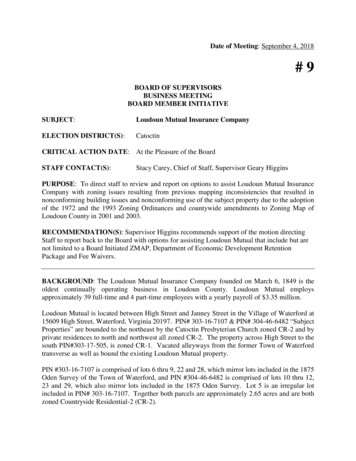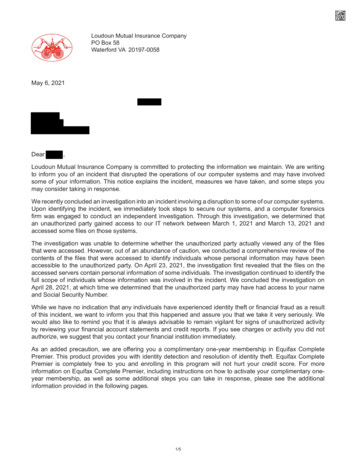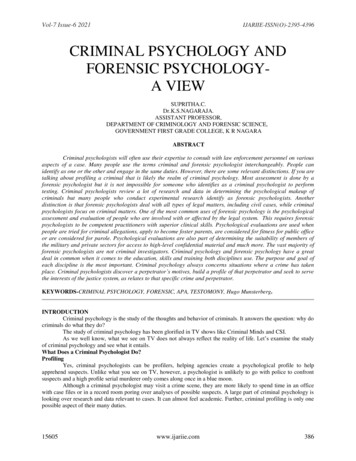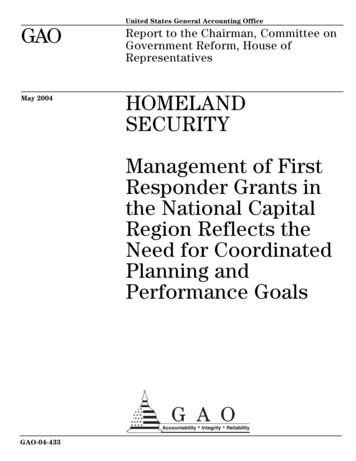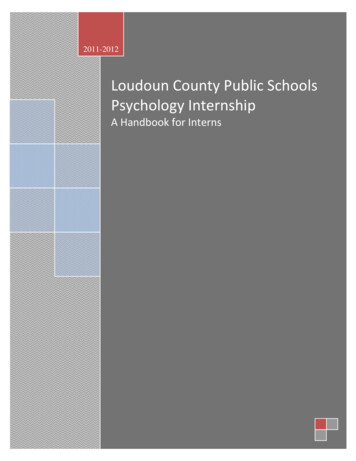
Transcription
2011-2012Loudoun County Public SchoolsPsychology InternshipA Handbook for Interns[Typstuffe text]
Note: Although the internship is submitting self-study materials to APA for the purposes ofobtaining accreditation, there is no guarantee that the internship will earn this status in time forthe 2011-2012 internship cohort, or ever. This internship is not APA accredited.Internship Training Program in Psychology 2011-2012Loudoun County Public Schools (LCPS) offers a full time internship for school psychology specialist(Ed.S., CAGS) and doctoral candidates. A stipend of 20,000 is provided as well as 20 paid holidays,ten sick leave days, three personal days, and liberal professional leave. It is anticipated that five fundedpositions will be available for the 2011-2012 academic year.Description of the InstitutionIn one of the fastest growing counties in the United States, LCPS currently serves more than 60,000students in 50 elementary schools (grades K-5), 12 middle schools (grades 6-8), and ten high schools(grades 9-12). LCPS educates students across multiple ethnic backgrounds representing 13%Asian/Pacific Islander, 8% Black, 13% Hispanic, and 63% White students. In addition, 8% of studentsare English Language Learners (ELL).PhilosophyThe psychology internship is the culmination of years of formal education and training in pursuit of anadvanced degree in psychology. It represents the last opportunity for formal, structured and closelysupervised training specifically designed to transform a student into an independent psychologist. Assuch, the internship represents the pinnacle of the training experience and therefore should integrate allprevious training experiences in an applied setting, enhance and expand upon interns’ existingknowledge base, and provide novel and unique training opportunities.Loudoun County Public Schools offers an internship consistent with the scientist-practitioner model oftraining originally offered by Monte Shapiro. This model highlights the use of the scientific method inevery aspect of psychological work, and emphasizes the importance of integrating science with practiceboth conceptually and operationally. We value this ideal above all else and actively seek to producepsychologists who think and act scientifically.Program GoalsThe program has eight goals: 1) produce interns who are competent in psychological assessment, reportwriting, and explanation of findings, 2) produce interns who are competent in prevention andintervention within a school setting, 3) produce interns who are competent in consultation, 4) produceinterns who are competent in providing services to culturally diverse populations, 5) produce internswho understand and work within the ethical and legal boundaries of the profession, 6) produce internswho demonstrate competence in professional development, 7) produce interns who are competent in theuse of research and the scientist-practitioner model, and 8) produce interns who are competent in the useof supervision to enhance professional growth.
Supervision ModelIndividual SupervisionInterns typically receive no less than two hours of face-to-face supervision per week from an assignedprimary supervisor. During this time, interns are expected to interact in a professional manner to discussplans and progress for service provision, professional issues, and other matters deemed important by theprimary supervisor and the intern.Group SupervisionEach week, interns participate in a minimum of two hours of group supervision where cases or topics ofinterest are discussed with the internship cohort. This group supervision is usually referred to as FridaySeminar by staff and interns. As appropriate to the topic at hand, Friday Seminars are led by the directorof training, internship faculty, staff psychologists, educational diagnosticians, and eligibilitycoordinators.Training ExpectationsA two-pronged approach is used to train interns in the delivery of direct services. The first approachinvolves year-long direct service to one school (i.e., a primary school placement) in which the intern isthe only psychologist providing psychological services (under supervision) to the school. The secondapproach utilizes a rotation model in which interns obtain time-limited exposure to various specialtytopics within the field of psychology while continuing to provide services to their primary schoolplacement. The rotations may be completed at any point during the school year. However, interns areexpected to consult with their primary supervisors and rotation supervisors early in the year in order toschedule rotations. Interns participate in all of the training experiences described below in order toensure appropriate breadth and depth of training. Primary School Placement – At the beginning of the internship, each intern is assigned oneschool (i.e., one elementary, middle or high school) to which he/she has responsibility for allservices typically provided by a psychologist. The intern has the ability to influence theplacement decision based on their preference and training needs. The rationale for assigning theintern to a primary school placement is to provide an authentic experience that reflects thetypical professional responsibilities of a psychologist practicing within a school setting. Theprimary school placement also provides interns an opportunity to foster professionalrelationships with teachers, school administrators, and other school-based service providers (e.g.,speech/language pathologists) that would not otherwise be possible using a typical rotationmodel. During their primary placement, interns are expected to demonstrate increasedcompetence and independence over the course of the year. Initially, interns shadow theirsupervisors in daily activities involving child studies, psychological evaluations, parentconferences, eligibility determinations, consultations, and interventions. Once internsdemonstrate knowledge of expectations and increased competence in meeting these expectationsindependently, the intensity of supervisory oversight is gradually reduced. By the end of theinternship year, interns have typically conducted anywhere from 25-35 psychologicalevaluations, participated in 50-100 child studies, provided numerous behavioral consultationsand managed several other responsibilities that are less easily quantified.
Secondary School Placement – Secondary school placements are assigned to interns in situationsin which the primary school placement does not provide the breadth of experience that is typicalof a psychologist practicing in a school setting. For instance, some schools do not haveformalized programs for children with Emotional Disabilities. Typically, psychologists provideservices to these programs in four ways: 1) attendance at multidisciplinary clinical teammeetings, 2) case consultation with regular and special education teachers, 3) development ofand co-leading group counseling sessions, and 4) conducting functional behavioral assessments(FBA) of problem behavior(s) and developing behavior intervention plans (BIP). If a secondaryschool placement is deemed necessary in order to provide the intern with appropriate breadth oftraining, the intern provides psychological services only in the area(s) that are unavailable by theprimary school placement.Rotations Preschool Evaluations – This rotation is designed to familiarize interns with the screening,evaluation, and eligibility determinations for children ages two through five. This rotationtypically begins early in the school year (i.e., September or October). The interns will gainexperience with the unique aspects of evaluating young children and in conducting adevelopmental clinical interview. During this rotation, interns are expected to observe the initialscreening process (referred to as Child Find in the state of Virginia) and complete twocomprehensive psychological/developmental evaluations. Initially, the interns will shadowsupervising psychologists during test administration, clinical interviews, preschool/homeobservations, parent feedback sessions, and eligibility meetings. After shadowing thesupervising psychologists, interns will complete two comprehensive evaluations under directsupervision. The first evaluation will involve extensive supervision (e.g., supervisors willobserve interns during test administration) whereas the second evaluation should theoreticallyinvolve more independence, assuming the intern has demonstrated a satisfactory degree ofcompetence while conducting the first evaluation. Interns will participate in eligibilitydeterminations for both evaluations under the observation of the supervisor.Rotation Supervisors: Nicole Sarampote, Ph.D. and Jed Lilly, Ed.S. School Neuropsychology - Interns will complete a school neuropsychology rotation during theirinternship year. The rotation is designed to provide an introduction to the application ofneuropsychological assessment and data analysis in the school setting. During the rotation,interns will develop an understanding of the design and use of three major neuropsychologicalbatteries: the WISC-IV Integrated, the NEPSY-2 and the Delis-Kaplan Executive FunctionSystem (D-KEFS). Training will include in-depth review and supervision of the use of theWISC-IV Integrated, the NEPSY-2 and the D-KEFS with the goal of demonstrating competencyin the administration and interpretation of each of these instruments. The emphasis throughoutthe rotation will include the use of a process approach to performance and data analysis within abrain-based educational model of learning.Rotation Supervisors: Christine Kalchthaler, CAGS, ABSNP and Michelle Black, Ed.S., ABSNP Assessment of English Language Learners (ELL) – The ELL rotation is designed to provideinterns with experience in the assessment of culturally and linguistically diverse children. Whenevaluating diverse children, it is typical to expect that a child’s level of acculturation and English
language proficiency will affect their performance on standardized tests. Since it is impractical,if not impossible, for examiners to eliminate all sources of test bias, the goal of assessment is toreduce the effects of cultural and language differences to the maximum extent possible. Byrecognizing the nature and source of potential biases in tests (including nonverbal tests),evaluators can more clearly understand the expected influence of culture and language on testperformance and conduct evaluations in a more valid and nondiscriminatory manner. TheCulture-Language Interpretative Matrix (C-LIM; Ortiz & Flanagan, 1998) is a research-basedmethod that assists in identifying and reducing bias in the interpretation of test performance.With this approach, the examiner is able to (1) evaluate the degree to which culture and languageinfluence a child’s test performance, (2) interpret the results within the context of expectedperformance patterns of diverse children with similar backgrounds, and (3) determine whetherthe results reflect cultural and language differences or the presence of a cognitive processingdisorder. During the course of the ELL rotation, interns are required to conduct twocomprehensive psychological evaluations for ELL students suspected of a specific learningdisability. At least one of the evaluations must be conducted on a child whose primary languageis Spanish so that the intern can gain experience in the use of the C-LIM.Rotation Supervisor: Primary Supervisor Pervasive Developmental Disorders (PDD) – The PDD rotation is designed to provide internswith experience in evaluating children suspected of an autism spectrum condition. Each internwill be expected to evaluate two children suspected of an autism spectrum condition, one of thechildren should be suspected of having a classic form of autism and the other should besuspected of having Asperger’s Disorder or a pervasive developmental disorder – not otherwisespecified (PDD-NOS). These evaluations may or may not result in the child being found eligibleunder the federal category of autism; a rule out of the condition is acceptable for meeting thegoals of this rotation.Rotation Supervisor: Primary Supervisor Educational Evaluations – This rotation is designed to give interns exposure to evaluationsdesigned to focus solely on a student’s achievement compared to his/her same age peers.Rotation Supervisor: Annie Owen, M.Ed, NCED and Primary Supervisor Low Incidence Evaluations – This rotation is designed to expose interns to low incidencepopulations such as intellectual disability or multiple disabilities. Each intern is encouraged toconduct an evaluation of a student suspected of a low incidence disability; however, because thispopulation is low incidence, it is possible that interns will not have this opportunity during thecourse of the year. This rotation is designed to allow interns to hone necessary skills such astesting the limits, out of level testing, modification(s) of test materials (as allowed by testmanuals), and providing feedback to parents regarding sensitive topics.Other Training ExperiencesInterns participate in a variety of other training experiences over the course of the school year inaddition to the primary school placement and the rotations. Many of these experiences may also involvecertification and continuing education credits. They include the following:
--Member of the Child Study Team – The Child Study Team (formerly Child Study Committee) isa multi-disciplinary team mandated by the state of Virginia to assist children in general educationwho are failing to make expected academic progress or who have other educational needs thatshould be addressed. In LCPS, psychologists attend all child study meetings at their assignedschools unless there are unusual or extenuating circumstances. Interns are expected to attendchild study meetings at their primary school. At the beginning of the year, interns will shadowtheir primary supervisors during child study meetings. After a brief period of shadowing, theywill be encouraged to actively participate in child study meetings. Interns will gradually assumegreater responsibility during the child study meetings until they eventually reach a point wheretheir supervisor is simply observing their performance during meetings and offering helpfulfeedback and suggestions afterwards. The goal is for the intern to reach a level of completeindependence during child study meetings before the second half of the internship year.Member of the Clinical TeamMember of the Central Office Crisis TeamCo-leader of Student Development GroupsDepression awareness and suicide prevention utilizing the SOS Signs of Suicide high schoolprogramResponse-to-Intervention (known as Responsive Instruction or RI in LCPS)Training in threat assessment by the Virginia Youth Violence Project (Cornell & Sheras, 2006)Training and certification in crisis intervention using the NASP PREPaRE curriculumTraining in the recognition and treatment of anxiety disorders in a school setting under themonthly consultative expertise of Tom Ollendick, Ph.D., Director of the Child Study Center atVirginia TechFriday SeminarsTo aid the skill development and expertise of each intern, weekly seminars are offered that cover anarray of topics. Seminars are typically chaired by the director of training with guest speakers of variousdisciplines invited routinely. A sample of topics is provided below.BIPCattell-Horn-Carroll (CHC) Theory of Cognitive Abilities and Cognitive AssessmentChild Abuse ReportingCognitive Hypothesis Testing (Hale & Fiorello, 2004)Conduct Disorder vs. Social MaladjustmentCounseling in the Schools- Individual- GroupCrisis InterventionCultural IssuesCulture-Language Interpretive Matrix (C-LIM; Ortiz & Flanagan); assessment of ELLEducational AssessmentEligibility Determination/Criteria and Deliberation- Specific Learning Disability- Autism- Developmental Delay- Emotional Disability
- Intellectual Disability- Other Health Impairment- Speech/Language ImpairmentEthical IssuesFBAIntervention Development and Design- Academic- Behavior management- Social skillsParent/Teacher ConsultationPositive Behavior SupportPrivate Evaluators/EvaluationsProfessional Issues (e.g., polishing a CV or resume; job interviewing skills)Report WritingResponse to InterventionRisk Assessment- Threat assessment- Suicide assessmentProfessional Development: Attendance, Participation, and PresentationInterns are expected to attend and participate in scheduled county staff development opportunities whenappropriate. Under the guidance of the director of training and the primary supervisors, interns arerequired to develop and present a professional presentation on a topic of their choice to diagnostic staff(i.e., staff psychologists and/or educational diagnosticians).LCPS is an authorized VDOE continuing education provider in the state of Virginia.The First Two WeeksDuring the first two weeks of internship, there are numerous procedural and logistical issues that mustbe addressed. Interns will meet with the internship training coordinator, Hillary DeBaise, to reviewprocedures associated with the following activities: Use of the daily calendar (i.e., how to log in, how to request leave, how to call in sick, when torequest personal vs. sick vs. professional leave) Use of voice mail (i.e., how to set up voice mail, how to check messages, script for voice mail,phone number for checking voice mail when out of the office) Monthly log (i.e., how to log in, when to submit monthly logs, understanding what constitutes a“classroom observation” within the log) Use of e-mail (i.e., how to set password, how to log in, how to set signature, how to create aconfidentiality statement) Use of business cards (i.e., how to request them and what to put on them) Office supplies (i.e., how and what to order) Mileage (i.e., how and where to document, in-county automated vs. in-county blank form forpreschool evaluations) Use of StarWeb and www.mylearningplan.com
Assignment of test kits (i.e., which kits individually assigned vs. shared, test kit closet, protocolcloset, master list of kits and assignments) Scoring software (i.e., what is available for computer scoring and where it is located, how to login, how to print) Report processing (i.e., review expectations and entire process, procedures for turning in reportsto secretaries, log book for testing, calendar for report due dates) Use of our library as well as 5th floor libraryMajor Intern ActivitiesInterns spend the vast majority of their time in direct services, which includes 3 primary activities: 1)child/adolescent psychological evaluations (20%), 2) consultations (15%), and 3)prevention/interventions (15%). They also engage in two major indirect services, Child Study (20%)and Eligibility meetings (10%). The other twenty percent of their time is devoted to infrequentdirect/indirect services (e.g., threat assessment, administrative meetings), report writing, didacticseminars, research, or supervision.Statement of NondiscriminationLoudoun County Public Schools (LCPS) and the LCPS Psychology Internship Program are committedto a policy of equal opportunity in all of its activities, including employment. LCPS and the LCPSPsychology Internship Program do not discriminate based on race, color,creed, religion, national, or ethnic origin, sex, sexual orientation, gender identity or expression,age, disability, or veteran status.Intern SelectionIntern applicants must currently be enrolled in a doctoral program in psychology at an APA accreditedprogram if applying for the doctoral track. Ed.S. or CAGS applicants must be enrolled in a NASPapproved program if applying for the specialist track. Applicants are required to submit several materialsfor review. These include: 1) cover letter expressing why the applicant is interested in the LCPSpsychology internship program, 2) a vita, 3) official graduate school transcripts, 4) three letters ofprofessional recommendation, 5) a statement from the university’s training director confirming that theapplicant is eligible for internship, and 6) a psychological evaluation report redacted to protectconfidential information. The applicant may include additional information (e.g., additional worksamples, published papers) to highlight unique interests or skills.The Director of Internship Training reviews each applicant’s materials and invites qualified candidateswho demonstrate a strong goodness-of-fit between the internship’s training capacity and the intern’straining interests and needs. Generally speaking, successful candidates are those who have extensiveexperience working with children and adolescents and who desire to work in a school setting or tocollaborate heavily with schools upon graduation. Practica or other practical experiences working inschool settings are preferred, but not required. Successful applicants are expected to have experiencesand training consistent with the theoretical orientation of the program. That is, we select applicants whohave experience and training that emphasizes the scientist-practitioner model or the related practitionerscholar model.
Applicants who are invited to interview undergo a two-part interview process. The first part of theinterview involves asking the applicant a series of structured, predetermined questions designed toreveal developing beliefs and philosophies as it relates to child and school psychology. It is alsodesigned to uncover the depth of the intern’s training and experiences and to assess the intern’s problemsolving abilities. Each applicant is asked an identical series of questions. The second part of theinterview is less formal, providing the intern opportunities to get to know the faculty and current internsand to ask any questions they may have about the internship program. Applicants are evaluated on nineareas of professionalism including job knowledge, experience, communication skills, interest in theposition & the organization, motivation & work ethic, professionalism & conduct, interpersonal &collaboration skills, poise, and insight & alertness.Internship Grievances and Termination PoliciesThe information provided below outlines the guidelines and procedures for documenting and managinggrievances and problematic intern performance or conduct. These guidelines incorporate the officepolicies of Loudoun County Public Schools (LCPS) and emphasize due process allowing interns to filegrievances and dispute decisions made by the internship program.Intern GrievancesAs a program, we believe that the majority of problems can be resolved through direct negotiationbetween the conflicting parties. Interns and staff members (supervisors and other staff) are encouragedto discuss problems and concerns with each other as a part of a working relationship. Supervisors andother staff are expected to be receptive to intern concerns and attempt to resolve and find a solution toconflicts in a timely manner. In situations where a satisfactory solution cannot be reached, or thegrievance is too severe for informal methods, the intern or staff member may seek out one of thefollowing options for a more formal resolution. These options are intended to help the interns resolveconflicts in an efficient and timely manner and are not intended to discourage interns from pursuing agrievance through other means.1. MediationThe intern and staff members have the option to request a mediator to help facilitate the conflictresolution process. The mediator can be the Director of Internship Training or a mutually agreedupon member of the staff. The role of the mediator is to provide an outside perspective and makerecommendations to the conflicting parties to help come to a satisfactory resolution.Recommendations made by the mediator that involve changes in the intern rotation or learningenvironment must be approved by the Director of Internship Training.2. Formal GrievanceFor conflicts and grievances that are not resolved through discussion and mediation, or areconsidered serious and severe, the intern may submit a written request to the Director ofInternship Training to initiate the formal grievance process. In the case of a formal grievance, thefollowing steps will be taken.a. The Director of Internship Training will call a meeting of the Internship TrainingCommittee to review the complaint. If the individual who is named in the complaint is onthe Internship Training Committee they will not be permitted to attend the meeting. Both
parties will be given notice of the meeting and will be able to provide any informationthey feel is necessary to evaluate the complaint. The Director of Training from theintern’s graduate school will also be notified of the meeting and, if possible, is welcometo attend in person or by phone conference.b. The committee will evaluate all the information provided by both parties and make adecision. The committee will base the decision on what is believed to be the best optionregarding the intern’s training experience. This may include a change in supervisor orschool setting.c. The intern will be notified in writing of the decision made by the committee and willhave the option to accept or appeal the decision. Acceptance of the decision will enact therecommended changes immediately. Appeals must be made in writing, outlining thereason(s) for the appeal and suggested recommendations by the intern. The Director ofInternship Training will review the appeal and make a final decision, which will beprovided in writing. In situations in which the Director of Internship Training is thesubject of the grievance, the Director of Diagnostic and Prevention Services will reviewthe appeal and render a decision.Probation and Termination ProceduresAs a program, we strive to develop competent and professional psychologists who exit the internshipready for the workplace. In very rare instances, interns may have difficulty reaching the competencylevels expected by the program for independent practice. In these situations, the internship program willattempt to identify and improve these areas through remediation and other resources. It is theresponsibility of the supervisor to notify the Director of Internship Training about concerns regardinginadequate performance so that a remediation plan can be developed as early as possible.In the case of inadequate performance, the Director of Internship Training will inform the intern of theconcerns that were presented and call a meeting of the Internship Training Committee to discuss the bestcourse of action to remedy the problem(s). The intern’s university Training Director will also beinformed of the concerns so that resources outside of the internship program can be considered indeveloping the remediation plan. The following steps will be taken for interns who need remediation inone or more areas.a. The intern will be placed on probation, indicating that there is a problem or concern aboutcompetency in one or more areas.b. A meeting will be held with the Internship Training Committee, the intern, and any otherrelevant parties to establish a training contract to address the areas of concern. The contractwill detail the area(s) in need of improvement and the resources that will be utilized to helpincrease competency in that area(s). The intern will be required to sign the training contractto acknowledge he/she has been informed that remediation is required and to commit totaking advantage of the plan to remediate the problems.c. The intern and supervisor will continuously report progress to the Internship TrainingCommittee so that adjustments in the training contract can be made based upon positive ornegative performance.
d. Probationary status may be removed by the Internship Training Committee if they believethat the intern has achieved satisfactory results from the remediation program.e. If the Internship Training Committee determines that the intern will not be able to makesufficient progress with the time remaining in the internship, a meeting will be held todetermine if the intern shall receive credit for the internship. In the case that the intern doesnot receive credit, the intern and the Training Director from the intern’s graduate programwill be notified immediately.Illegal or Unethical BehaviorIt is the responsibility of all staff, including interns, at LCPS to report illegal or unethical behavior in theworkplace. The Director of Internship Training should be notified, immediately, in writing, of allinfractions. The following may be possible outcomes of reported infractions.a. The Director of Internship Training, along with the intern’s supervisor, will address thereported behavior with the intern and a record of the complaint will be recorded in theintern’s file.b. In cases where the infraction is deemed to be major (e.g., grossly unethical behavior), ameeting of the Internship Training Committee will be called and the infraction will bereviewed. Following careful review, the committee will determine the appropriate course ofaction which may include probation or termination. In either case, the intern as well ashis/her graduate program will be notified immediately. In addition, illegal behavior in theworkplace will be reported to the local police department.
Intern EvaluationsInterns are formally evaluated by their supervisors twice annually using the Intern CompetencyAssessment Form (see below). Evaluations are verbally reviewed with the intern for the purpose offacilitating a constructive dialogue. Interns sign and receive a copy of each evaluation and a copy is sentto the intern’s university.PSYCHOLOGY INTERNSHIPCOMPETENCY ASSESSMENT FORMIntern:Supervisor(s):Rotation(s):Date:First Semester Evaluation: End of Year Evaluation: (Check One)ASSESSMENT METHOD(S) USEDDirect ObservationReview of Raw Test DataCase PresentationReview of Written WorkDiscussion of Clinical Int
Internship Training Program in Psychology 2011-2012 Loudoun County Public Schools (LCPS) offers a full time internship for school psychology specialist (Ed.S., CAGS) and doctoral candidates. A stipend of 20,000 is provided as well as 20 paid holidays, ten sick leave days, three personal days, and liberal professional leave.
